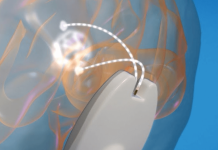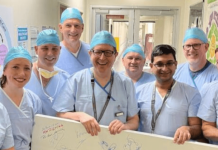Peytant Solutions announced positive pre-clinical outcomes for its AMStent tracheobronchial covered stent system.
Dr. Roy Joseph Cho of the University of Minnesota presented the outcomes at the 2025 American Association for Bronchology and Interventional Pulmonology (AABIP) Annual Meeting. Findings demonstrated superior results compared to a commercially available synthetic polymer-covered stent.
Related: Stimvia reports positive outcomes with neuromodulation for Parkinson’s
Plymouth, Minnesota-based Peytant designed its AMStent to treat pulmonary obstructions caused by cancer. The novel, proprietary therapy platform is indicated for treating tracheobronchial strictures produced by malignant neoplasms in adult patients.
The company developed AMStent as the first product offering within its amnion-based covered stent platform. It combines a minimally invasive catheter delivery system with a stent covered in material created from amnion.
According to Peytant, many patients with cancer develop malignant airway obstructions as their disease progresses. Palliative care often takes place through increasing airflow in the trachea or tracheobronchial tree through dilation of the lumen. Once patients have their airflow restored, they can receive routine airway stents in the passageway.
In the study, AMStent was associated with significantly less mucus buildup, integrating with airway tissue as early as day seven and achieving full integration by day 90. In comparison, a third of the control stents proved fully occluded and showed significant airway complications.
AMStents also showed no stent migration while control stents showed frequent migration. This led to significantly less inflammation and restored the structure and function of the epithelial layer. Investigators observed results over 90 days in a porcine model.
The stent picked up FDA de novo clearance in October 2024. Peytant now plans to commercially launch it in the U.S. later this year. It also expects future research to explore its potential for other luminal applications. Those include vascular, gastrointestinal, neurological, and urological systems.
“We’re on a mission to fundamentally transform the treatment of luminal diseases using patented, foundational biomaterial technology,” said John Schorgl, Peytant Solutions co-founder, CEO, and board chair. “These results reinforce our belief that the AMStent system has the potential to set a new standard of care.”




